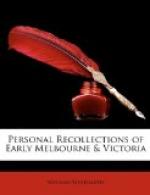But the grand prize for these Germans was the acquisition of land. Accordingly Captain Stanley Carr (then on a visit with the German Prince of Schleswig-Holstein) and myself took up, in trust for such Germans as desired it, and had the means of payment, one of the square miles of surveyed land, as yet unapplied for, about twelve miles north of Melbourne, which was divided amongst them in lots as agreed upon. And there they are to this day, a thriving community. When, in company with Neuhauss, my wife and I visited them in 1857, just before finally quitting the colony, we found considerable progress in the form of a scattered village, with a little Lutheran church, and some show of gardening and cultivation. They seemed delighted to stick to their German speaking, and would not even try to speak English. One amusing feature in the scramble as to allotments was that each tried, in most cases, to get trees, stones, and rocks in preference to clear ground, as if so much additional wealth. The trees might have had value for firewood, but in the other items they had probably more than they bargained for. We secured the land for them at a pound an acre, and the fact of their being so largely settled upon it raised its value at once considerably. All the land thereabout has now risen to many times this first cost. Many more Germans have since, as I understand, settled upon other land.
The exact value of the German immigration to Australia may be to us a differing estimate, but I think we mostly give it a decided welcome. Lord Grey, as I recollect, was attacked in Parliament by the political opposition for thus spending money on foreigners which might have better gone to our own destitute, etc., etc. And I myself was repeatedly so attacked, but always in a like merely political opposition way, when anything is let fly at an opponent that will serve the momentary purpose. In the heat of the O’Shanassy contest for Melbourne, for instance, I was accused of having told the Silesian peasants that they were wanted to set an example of sobriety to the drunken Irish. But I easily escaped from that noose by the rejoinder that, if I did say anything of the kind, it must have been of my own countrymen, as an Irishman can never stand to a Highlander at whisky. The true point of the question is the denationalizing of our race, which is so seriously threatened, for example, by the import of Chinese. We know that something of French, Flemish, Dutch, and Danish-Norse, along with a leading dash of German, all grafted on the old British stock, have evolved the modern Englishman. Substantially, therefore, we are only reopening this useful manufacture, which was effectively begun for England fifteen centuries back.
THE GERMAN PRINCE.
“Come of a gentle, kind, and noble stock.” —Pericles.




